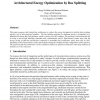Free Online Productivity Tools
i2Speak
i2Symbol
i2OCR
iTex2Img
iWeb2Print
iWeb2Shot
i2Type
iPdf2Split
iPdf2Merge
i2Bopomofo
i2Arabic
i2Style
i2Image
i2PDF
iLatex2Rtf
Sci2ools
TCAD
2002
2002
Architectural energy optimization by bus splitting
This paper proposes split shared-bus architecture to reduce the energy dissipation for global data exchange among a set of interconnected modules. The bus splitting problem for minimum energy is formulated as a Minimum-Exchange Bus Split problem, which is shown to be NP-complete. The problem is solved heuristically by using a max-weight matching algorithm and combinatorial search. Experimental results show that the energy saving of split-bus architecture compared to monolithic-bus architecture varies from 16% to 50%, depending on the characteristics of the data transfer among the modules and the configuration of the split-bus. The proposed split-bus architecture can be extended to multi-way split-bus architecture when large numbers of modules are to be connected.
Related Content
| Added | 23 Dec 2010 |
| Updated | 23 Dec 2010 |
| Type | Journal |
| Year | 2002 |
| Where | TCAD |
| Authors | Cheng-Ta Hsieh, Massoud Pedram |
Comments (0)

